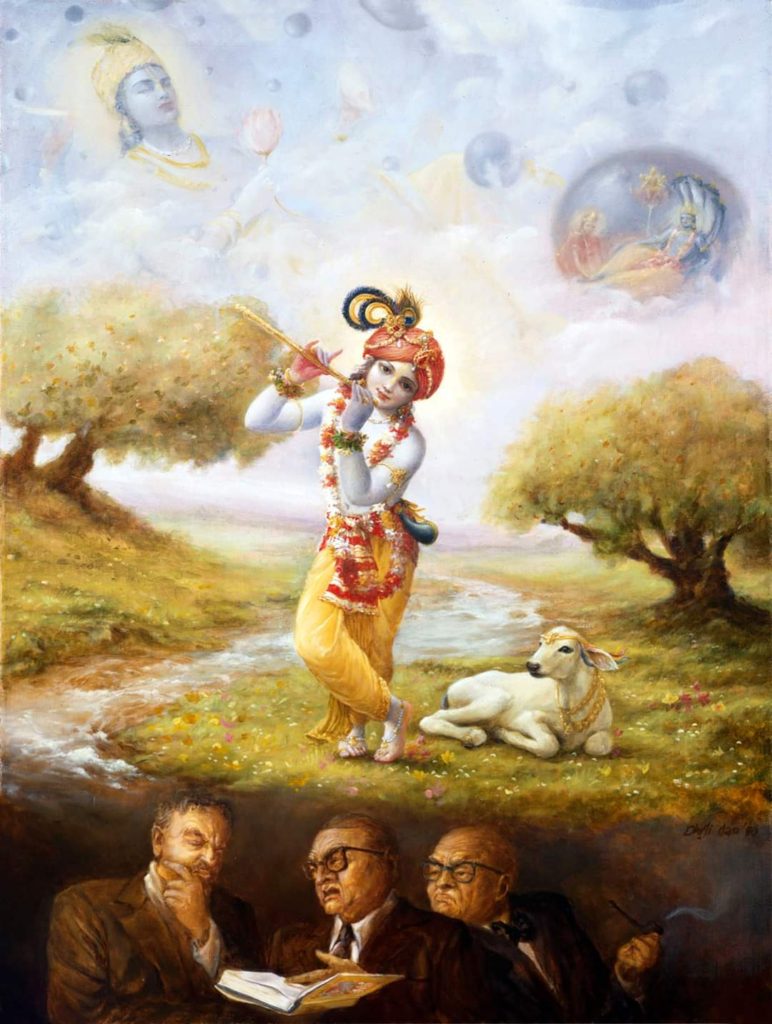One important topic in the Bhagavad-Gita is the difference between Karma, Akarma, and Vikarma. This is a very important concept to grasp if we want to understand the message of the Bhagavad-Gita.

“Karma” in this context means fruitive activities done according to the injunctions of the scriptures. That’s what we would call good karma or pious activities. This is the type of activity that brings material happiness in future lives. This is generally connected with performing one’s duty in the Varnasrama system, acting piously according to the guidance of scriptures, but doing so for the material results, out of attachment.
“Vikarma” on the opposite are impious activities, done in opposition to the recommendation of the scriptures. Even if they bring some momentary gratification, such activities will bring suffering in the long run. If one opens a beer factory, for example, he may make some money, but later he will have to deal with the karmic results of such work. Much of what people do nowadays fits into this category, but this is the type of work that should be avoided.
Finally, we have “Akarma”, which are spiritual activities that destroy the results of both Karma and Vikarma, gradually freeing us from this illusory world. When one is building cars for the Ratha Yatra festival, for example, he is not accumulating new Karma, although dealing with money, workers, and so on. On the opposite, such work gradually frees him from the results of all his past activities.
In short, “Karma” means pious activities, “Akarma” means spiritual activities, and “Vikarma” means sinful activities. This is explained by Krsna on Bg 4.17:
“The intricacies of action are very hard to understand. Therefore one should know properly what action is, what forbidden action is and what inaction is.”
In this verse, Karma is translated as “action”(meaning pious activities), Vikarma is translated as “forbidden action” and Akarma is translated as “inaction” (in the sense that it doesn’t accumulate Karma).
Prabhupada further explains it in his purport to the second verse of Sri Isopanisad: “Actions that are performed in terms of one’s prescribed duties, as mentioned in the revealed scriptures, are called karma. Actions that free one from the cycle of birth and death are called akarma. And actions that are performed through the misuse of one’s freedom and that direct one to the lower life forms are called vikarma.”
Understanding this definition helps us understand several verses from the Bhagavad-Gita. On 4.18, for example, Krsna says:
karmaṇy akarma yaḥ paśyed
akarmaṇi ca karma yaḥ
sa buddhimān manuṣyeṣu
sa yuktaḥ kṛtsna-karma-kṛt
“One who sees inaction in action and action in inaction is intelligent among men, and he is in the transcendental position, although engaged in all sorts of activities.” (Bg 4.18)
What does “inaction in action and action in inaction” mean? The word “Karma” is here translated as action, and “Akarma” is translated as inaction.
A materialist may think that a devotee is accumulating lots of karma by building so many temples, printing books, and organizing big festivals, but all of this is in reality Akarma that is actually freeing the devotee from the results of his past actions. A devotee is thus working very hard but is not accumulating any new Karma. This is “inaction in action” (karmaṇy akarma). Because everything is done for Kṛṣṇa, he enjoys only transcendental happiness by doing his service.
On the other hand, a devotee may observe that a false renunciant, who stopped performing his duties out of fear of the reactions and not due to true detachment is actually accumulating a lot of reactions because he is neglecting his duties. This is “action in inaction” (akarmaṇi ca karma). He is accumulating lots of Karma, although he is apparently not doing anything.
